The coronavirus gave them jobs — and a new lease on life
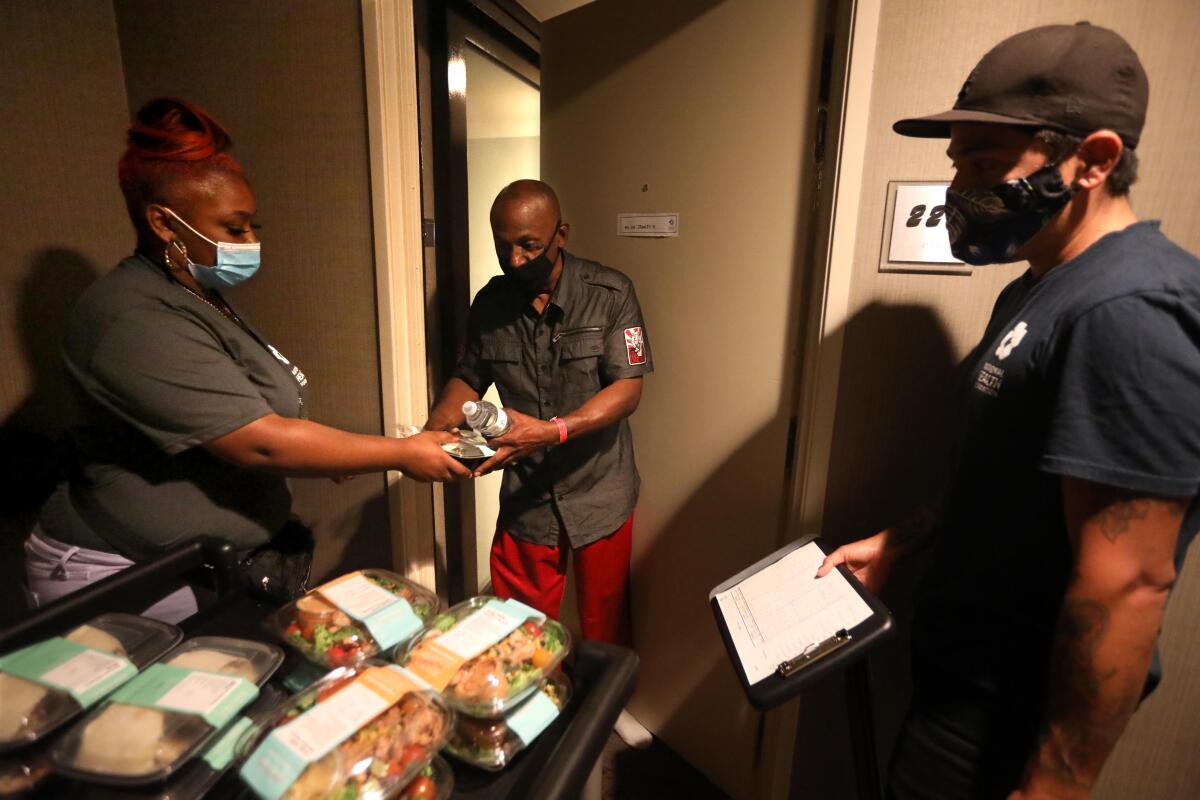
- Share via
After 52 weeks of anger management, Mia Rogers found maintaining her inner peace easier than finding a job.
Her two-year probation had ended in February. With her felony assault conviction reduced to a misdemeanor, the 23-year-old was just getting into the groove when the coronavirus shut everything down.
“I had nowhere to look for work,” she said.
After a couple of months living on the edge of homelessness, Rogers found her way to Chrysalis, the downtown nonprofit that prepares the hard-to-employ for work and finds them jobs.
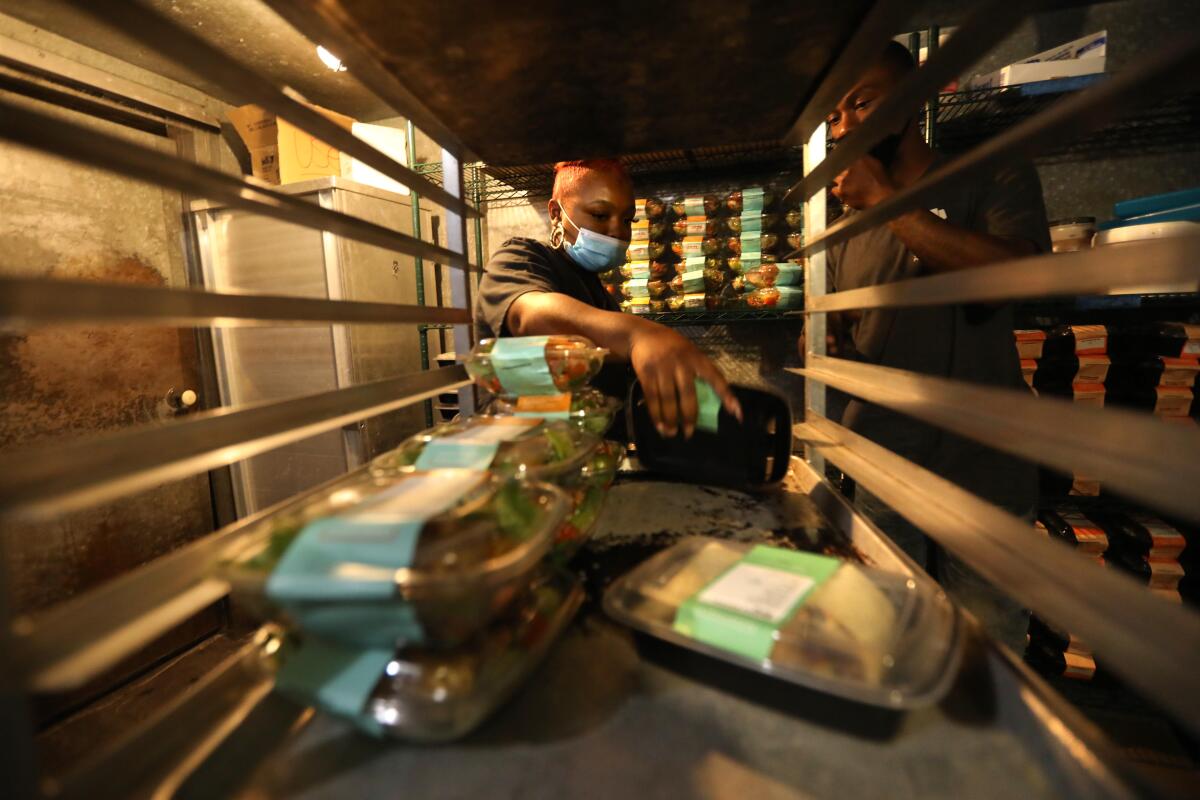
Today she has a job that fits her outgoing personality and has her thinking positively about the future. By an odd twist, she owes it to the coronavirus.
Rogers is one of dozens of Chrysalis employees working at hotels and motels on lease to Los Angeles County to shelter homeless people who are at risk of complications from COVID-19 because of their age or medical conditions.
As the Los Angeles Homeless Services Authority built staffs to run the 38 hotels that are now leased through Project Roomkey, it needed to fill a variety of jobs not usually associated with hospitality — security guards, case managers, nurses and dozens of people to tend to the guests’ needs.
Their duties include going door-to-door to deliver three pre-packaged meals and two snacks daily, sanitizing, record-keeping, making sure guests wear masks and keep their distance and, importantly, maintaining a positive environment for fragile people who are isolated in their rooms for long hours every day.
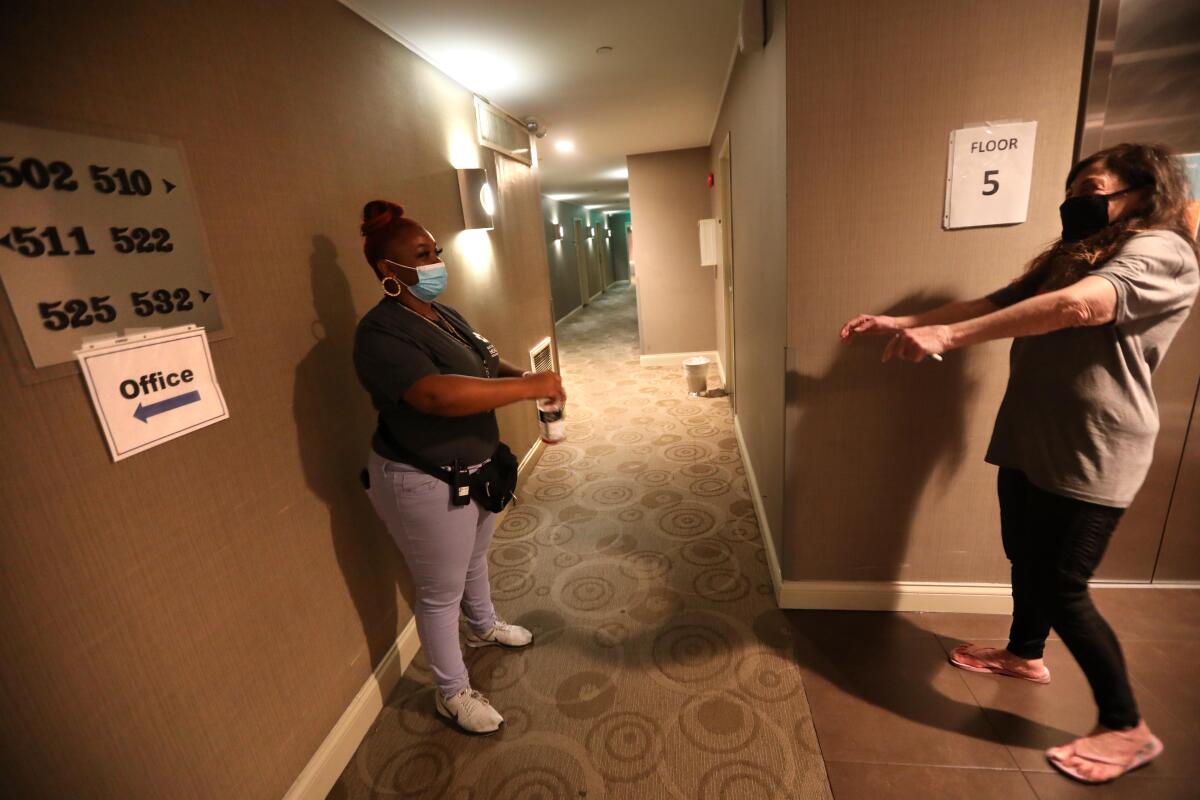
Those assignments are mostly filled by Los Angeles city and county workers displaced from their regular jobs. The city hired Chrysalis to supplement its workers in 15 of the hotels.
It was a good fit for Chrysalis’ transitional jobs program. While preparing for permanent jobs, about 450 clients work for the agency. They make a little above minimum wage and get job experience and something to put on their resumes.
Most are contracted to business improvement districts, which assess property owners in an area to supplement city services. Easily identifiable in yellow, green and purple T-shirts that signify their district, they push brooms and trash cans picking up downtown’s detritus. Others are janitors at a homeless services agency, work with freeway road crews or tend the city’s homeless storage facilities.
Since Project Roomkey began, about 120 of Chrysalis’ transitional workers have gone to work in hotels, and about 55 are currently on the job.
Rogers is one of 12 Chrysalis workers assigned to a 94-room hotel in the Fairfax district. It’s the only one of the 38 Project Roomkey hotels that has a beefed-up nursing staff to function as a recuperative center for people who have active medical conditions that require attention. It’s not equipped for quarantine, so guests who test positive for COVID-19 are moved to other sites for isolation. (The Times is withholding the identity of the hotel to protect the privacy of its guests.)
She arrives for her morning shift at 7, after a 45-minute bus ride from South L.A. Part of her day is in the lobby, converted to an office. Working with homeless people has been a revelation for Rogers.
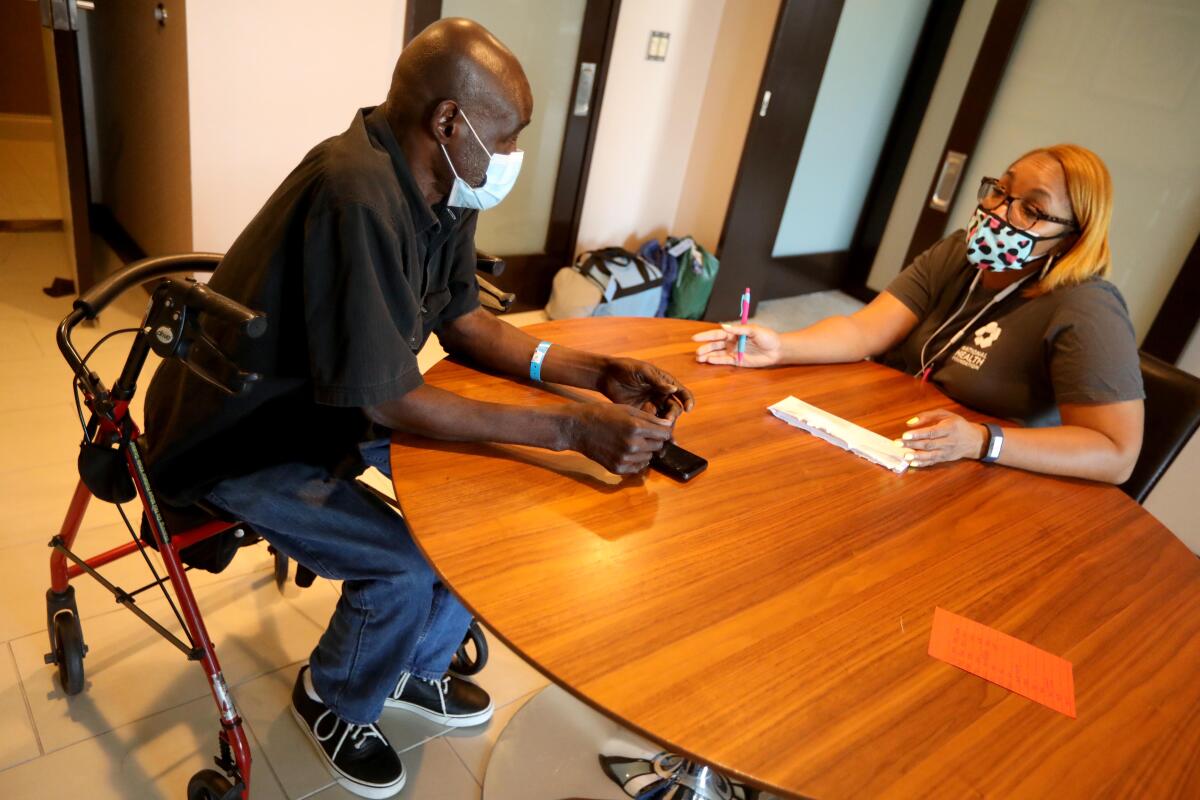
“Where I come from, South-Central, you would think homeless people is just drug addicts,” she said. “You wouldn’t really look into their stories, learning it’s from mental illness, some people just down on their luck. It’s been really touching here. Really touching.”
About half the Chrysalis’ workers, like Rogers, have criminal convictions that limit their job potential.
For one of them, a colleague on the morning shift, the chance to work with the nursing staff could be a boost for her chosen career.
But for now, a nursing license is out of the question for Dwona Beroit, who said she spent 32 months in prison for carrying a firearm.
“Probably later in life after I get it expunged,” she said of her hopes for a credential.
After prison, Beroit entered a state-funded residential treatment program in El Monte. From there she was referred to Chrysalis. Project Roomkey is giving her work and — a key goal of the transitional job program — a resume in line with her goals.
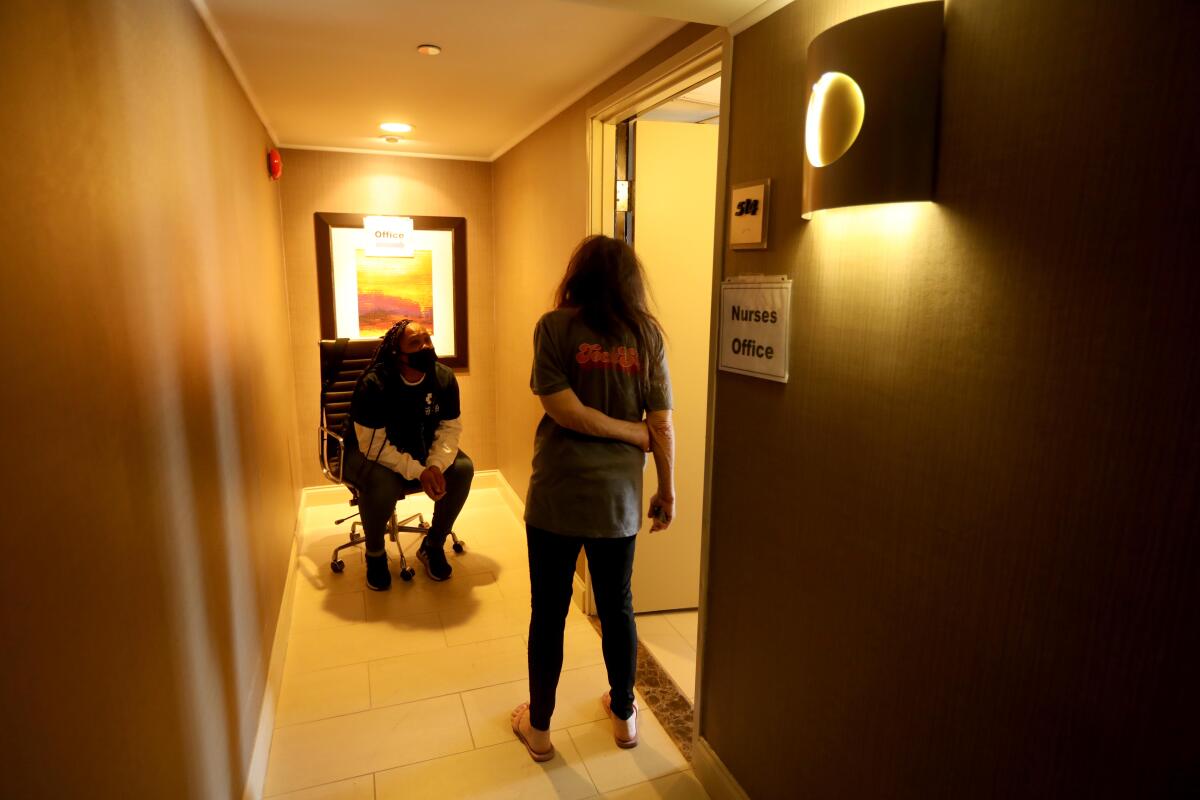
Her plan is to return to school this fall to become a certified nurse’s assistant.
“I think I found my niche,” she said. “I can always help people.”
Filling out the morning shift are Jonas McClanahan, an Army veteran recently released after four years in Ironwood prison, in Blythe, for burglary, and Jon Crosby, an Ohio transplant who found himself on the street when his job at Chipotle evaporated.
McClanahan, 37, had lived at a recovery program in Venice for several weeks when the stay-at-home order forced him to make a tough choice. The home didn’t want residents coming and going every day, he said.
“I had to choose between staying there and sitting around or going to work and get my life back together,” he said.
He chose Chrysalis and Project Roomkey. He lived on the streets until he found a room for rent in a house. He’s about to move into his own apartment. He thinks he can make it on his $17-an-hour salary.
“I don’t eat out, can’t go to movies,” he said.
Divorced by the mother of two of his children, he looks forward to reuniting with a son whose mother has died and is living with grandparents. Beyond that, he has only a hazy view of what happens after Project Roomkey comes to an end.
“I feel lucky to be working,” he said. “I’ve got a lot of applications out there.”
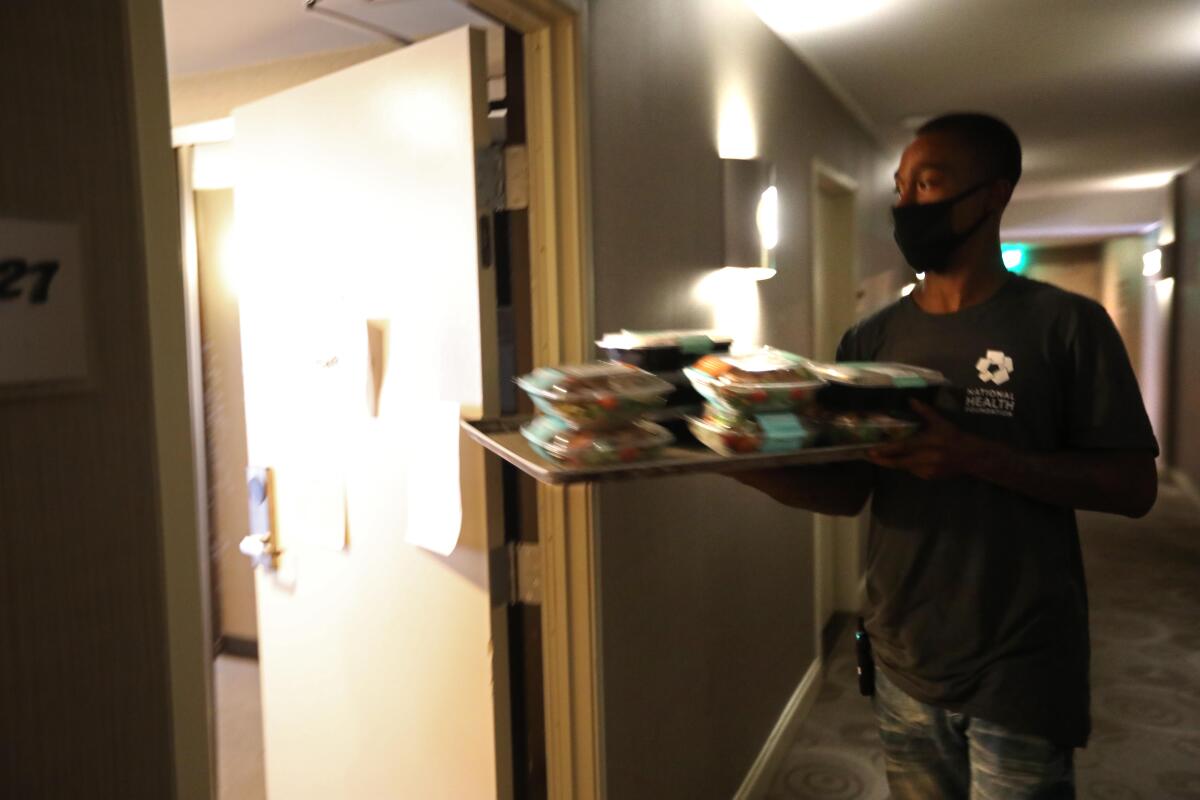
Crosby, 27, landed on skid row shortly after his 2018 move to Los Angeles. He got away with the help of friends who let him stay with them and was renting a guest house in Burbank when he lost his job and couldn’t pay his rent. He went back to what he knew, skid row.
On a tip, he walked into Chrysalis.
“Within a week I got a job,” he said.
For now he lives in a house in Hollywood converted by its owner to congregate living with five beds in each of its three bedrooms.
“Just a place to live,” he said. “Helping people get off the street.”
Just before noon the four workers loaded carts in the food storage room and rolled them to their floors.
Accompanied by a caseworker and registered nurse, each began knocking on doors.
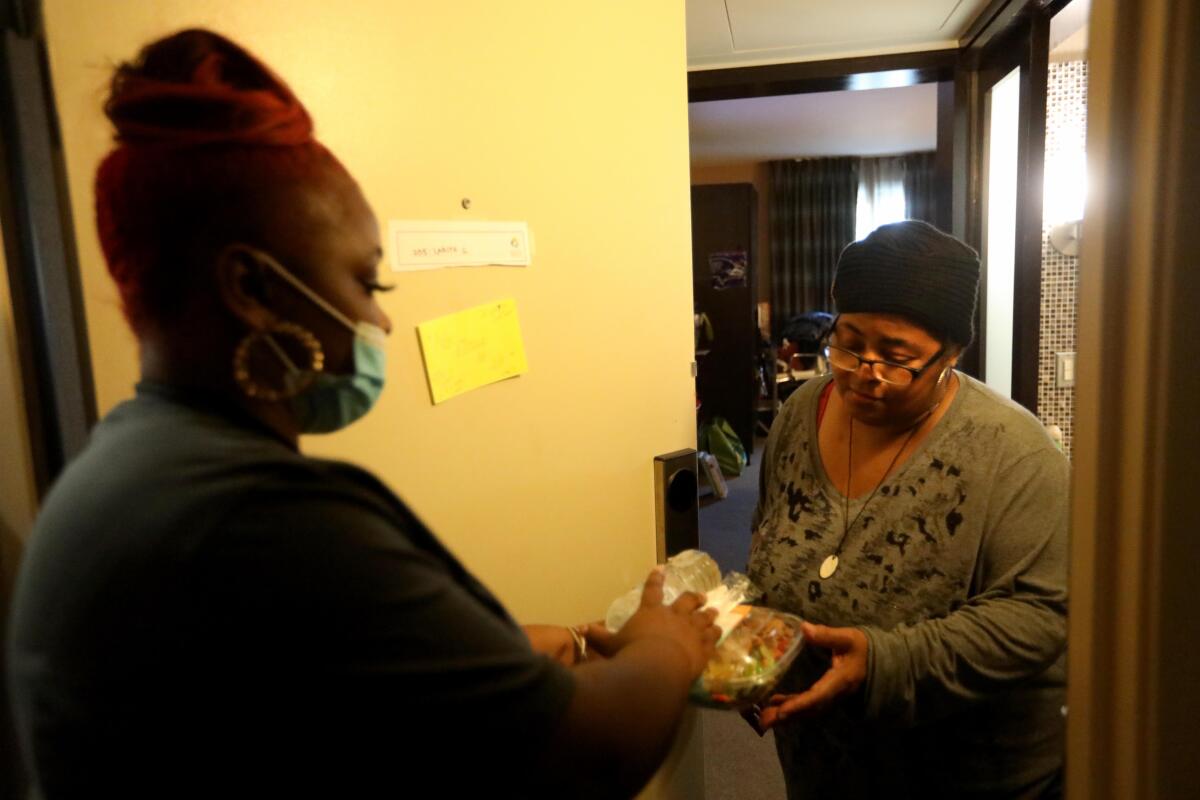
“Elizabeth. Lunch time,” Rogers shouted outside a door.
A frail woman opened the door.
“Going to get your temperature,” the nurse said, aiming a device at her forehead.
“Do you have any questions, concerns, anything I should know about?” the caseworker asked.
She didn’t.
“You want a chicken wrap?” Rogers asked. “How many waters, one or two?”
The woman took the offering and returned to her room. The team moved on to the next door.
“You gotta know what they like,” Rogers said. “I have to convince people that say, ‘I just want cookies and snacks.’ I say, ‘This tastes just like cookies and snacks.’ ”
More to Read
Sign up for Essential California
The most important California stories and recommendations in your inbox every morning.
You may occasionally receive promotional content from the Los Angeles Times.










